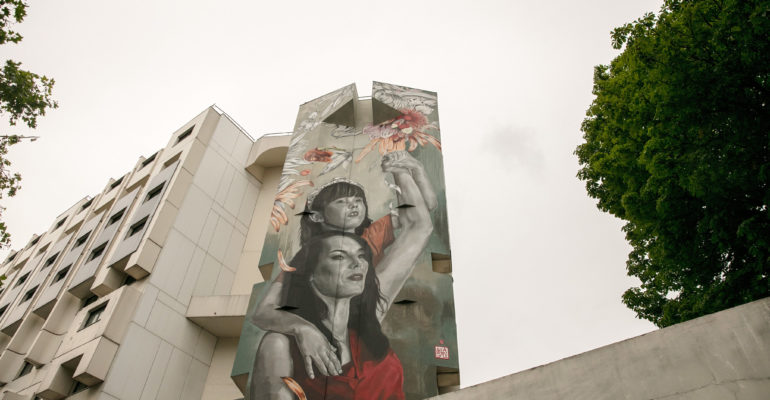Will we finally see a breakthrough? compensation for 25 years of small steps?
by SI UN Representative, Marie-Christine Gries
The Generation Equality forum in Paris began on 30 June, 2021 with an opening ceremony of nearly four hours well used, on an intensive pace. The general tone was set from the address of the President of the French Republic, Emmanuel Macron: no political tongue-in-cheek, no evasive overflight, no laborious justifications on the slow progress since Beijing…
Individual interventions and round tables were followed by the participation of several heads of State and ministers from all regions including the vice-president of the USA, the General Secretary of the United Nations (UN), the General Director of the World Development Bank, the presence in Paris of the General Director-of UNESCO, the Executive Director of UN Women, leaders of major international companies, and iconic figures of feminism and humanitarian action, including Hillary Clinton and Melinda Gates. The event included activist witnesses with their heads held high, often moving, always inspiring, and included two Nobel Peace Prize winners, Nadia Mourad and Denis Mukwege.

Photo: Scenes from the Opening Session of the Generation Equality Forum, held in Paris, France on 30 June 2021. Photo: UN Women/Fabrice Gentile
We heard promises of significant and quantified investments (40 billion USD) , both from international governmental institutions (UNESCO, States, African Development Bank and World Development Bank), as well as leaders of Humanitarian Foundations including Melinda Gates, and major industrial groups – Kering and Accor for the deployment of the “Maison des Femmes” in France, and others from elsewhere.
The atmosphere at the meeting of great voices and eminent leaders, had all the force of a brutal awakening; an electroshock that the COVID-19 crisis seems to have caused by pointing a beacon on the fragility of the achievements of the status of women.
Most of the critical topics that should be addressed by the forum were presented:
Simone Veil (Former President of the European Parliament) warned of the fragility of women’s rights as cited often, but this time with concrete evidence, tragic examples, including, first, the universal rise of violence against women. Turkey’s denunciation of the Istanbul Convention has been criticised and according to a Turkish speaker, the loosening of vigilance against domestic violence is already sensitive in Turkey.
The global average increase in domestic violence is often given as 25 per cent, but in some countries, it is more than 50 per cent (figures stated by the President of the Republic of Kenya on African countries).
Early marriages and teenage pregnancies have also surged. Rape, harassment and various abuses were promoted by the lockdown and closure of schools.
The drop-out of school rate for girls appears to be more persistent, and Audrey Azoulay put in front of this observation that overall progress in girls ‘ education was unevenly achieved by regions, with much of it attributable to Asian, suggesting that in some countries, a poor progress has been almost deleted by the crisis.
In addition, the issue of the absence of women in artificial intelligence, the low share of girls engaging in science and in the digital sector, highlighted by the Secretary General of the United Nations António Guterres, is critical, imperative for the accession of women to the highest responsibilities in the future. Mr. Guterres also spoke of the pernicious sexism conveyed by algorithms built almost exclusively by men, aware or not of their prejudices.
Many speakers shared their concerns and observations – disillusionment from Aya Chebbi, a Tunisian feminist who hoped so much for the Arab spring, and very simply summed up the aspirations of women: work, freedom, dignity. On the topic of women and work, women’s entrepreneurship, and women’s empowerment: “Equal work, equal pay” – the account is far from fair, with Melinda Gates highlighting a lack of data to assess the damage of the crisis on the sectors of the informal economy, which is mainly the field of women. Regarding women’s health, sexuality, and reproduction: a Sudanese speaker said that in Africa COVID vaccines are missing, especially for women, and mentioned consanguineous marriages still in use in her country, noting the abolition of female genital mutilation is still far away.
A Polish activist spoke about the regressive laws passed in her country and their consequences on women’s freedom, as well as the threat of the rise of fundamentalists. Strong words were spoken at the meeting: accountability (for officials and decision-makers), transparency, an end to impunity, and leadership for women.
Hilary Clinton called for power to be shared with young people, ending her speech by saying: “we must fund equality, not talk about it “.
Let us see if this forum will keep its promises.
More HERE
Lead Image: 29 June 2021 – Ahead of the opening of the Generation Equality Forum in Paris, France, dignitaries gather to view a new mural produced for the forum by street artist Lula Goce. Photo: UN Women/Fabrice Gentile
All images courtesy of UN Women FLICKR

